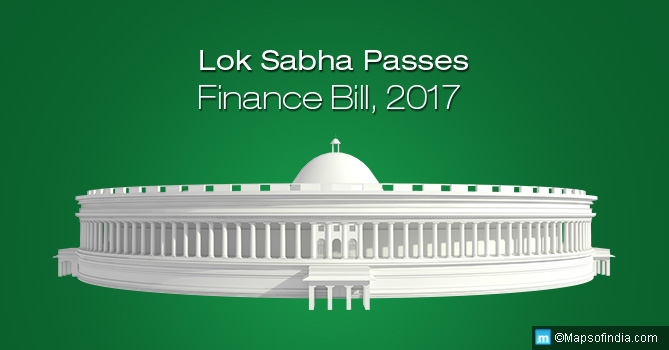The Finance Bill, 2017, was passed in the Lok Sabha yesterday. The bill is not a new piece of legislation but a bunch of 40 amendments to existing laws. A number of issues such as current taxation laws, returns filing and IT raids, Aadhaar card linkage, cash transaction limits, mergers of public tribunals, etc. have been addressed by the bill.
Major Amendments
Here are some of the major amendments coming through with passage of the Finance Bill 2017 –
- Legal cash transactions will now be capped at Rs 2 lakh with effect from April 1, 2017. The originally proposed limit for cash transactions was Rs 3 lakh.
- In another effort to curb tax evasion and black money frauds, citing the Aadhaar number will be mandatory for filing income-tax returns. To acquire a Permanent Account Number (PAN) card, as well, the applicant will need to provide Aadhaar card details. The government intends to make Aadhaar the only identification necessary for all Indians.
- When the government undertook demonetisation, one of the main intentions was to clean up political funding. The new amendments introduced will relax the conditions on contributions to political parties made by corporations. Previously corporate entities could only contribute a maximum of 7.5 percent of their average net profit (of past three fiscal years) as a political contribution. This cap has now been removed, allowing for higher donations while ensuring all transactions are accounted for.
- Political donations from any source must now come largely in the form of cheques and digital payments making them easy to trace. Cash donations to political parties have been capped at Rs 2,000. The government has also proposed that the RBI and banks issue electoral bonds that can be bought by donors and can be redeemed by the political parties.
- The corporate tax for small firms (annual turnover not exceeding Rs 50 crore) will now go down by 5 percent to 25 percent. Personal income tax for people earning between Rs 2.5-to-5 lakh will be down from ten percent to five percent. Tax on incomes over Rs 10 lakh will go up with the addition of a 15 percent surcharge.
Restructuring Tribunals
Ever since the NDA took charge of the central government in 2014, the administration has made various changes to enhance the ease of doing business in the country. The merger of various tribunals under the Finance Bill 2017 is another such measure, the government claims.
Faster disposal of disputes and cases by the tribunals can be achieved if there are fewer such bodies, said the Finance Minister. With this in mind, eight different tribunals have been merged with other tribunals and the bill has approved instating parity of pay for the judges.
- Competition Appellate Tribunal to be merged with National Company Law Appellate Tribunal
- Cyber Appellate Tribunal and Airports Economic Regulatory Authority Appellate Tribunal to be merged with Telecom Disputes Settlement and Appellate Tribunal
- Employees’ Provident Funds Appellate Tribunal will be merged with Industrial Tribunal
- Copyright Board to be merged with the Intellectual Property Appellate Board
- Foreign Exchange Appellate Tribunal to be merged with Appellate Tribunal for Forfeited Property
- Railways Rates Tribunal will be merged with the Railway Claims Tribunal
- National Highways Tribunal will be dissolved.
Criticism
The Finance Bill 2017 was passed as a Money Bill. Thus, it does not require the approval of the Rajya Sabha (which can only make suggestions) and will be sent directly to the President for ascent.
The bill has drawn much flak since it was tabled. The NDA government has been criticised for bypassing the Upper House where it lacks majority. Opposition also went on to say that the rationalisation of tribunals would lead to a loss of expertise and lead to further complacence and confusion.
The move was also deemed to be the government’s attempt to control these bodies, which have hitherto remained autonomous. This is because the government soon intends to pass appointment reforms laying down appointment guidelines for the remaining tribunals.
The logic of merging Cyber Appellate Tribunal and Airports Economic Regulatory Authority Appellate Tribunal with Telecom Disputes Settlement and Appellate Tribunal has also been questioned, given that all three are completely unrelated areas.






